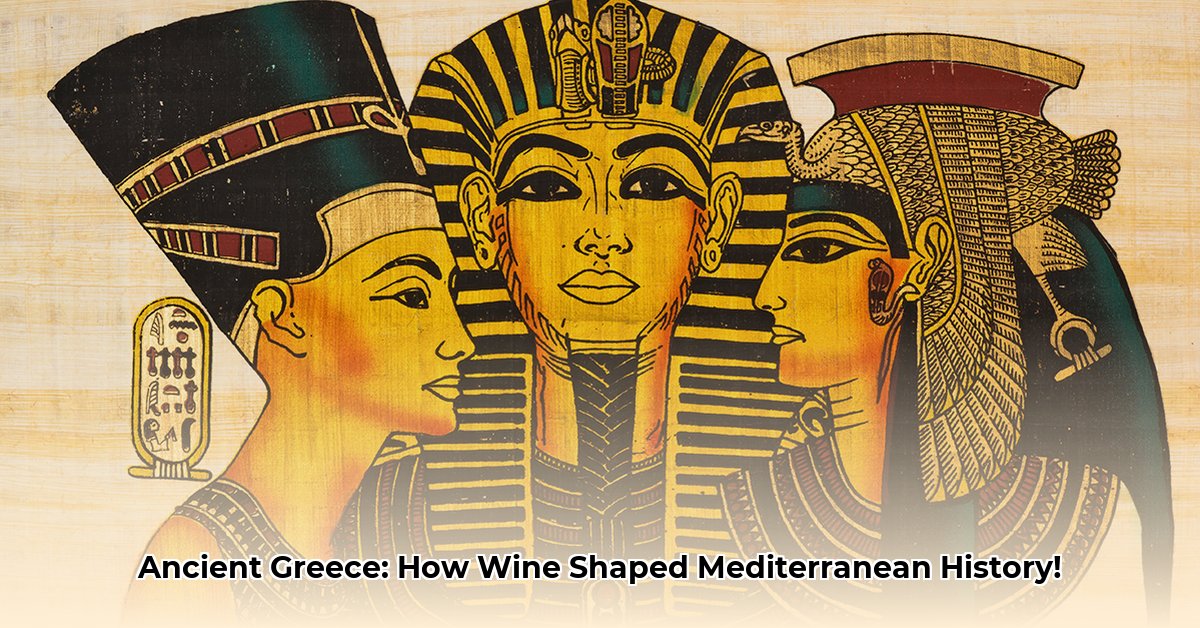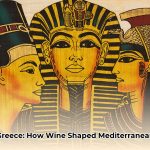## Unveiling the Deep Roots of Ancient Greek Winemaking and Its Mediterranean Dominance
Imagine a ship, laden with clay jars, sinking into the cerulean depths of the Aegean Sea. Each jar, an *amphora*, sealed against the encroaching water, holds the liquid gold of ancient Greece: wine. More than just a beverage, **ancient Greek wine** was a vibrant force, weaving through every facet of civilization—from trade and diplomacy to religion, daily rituals, and profound intellectual discourse. As expert analysts of historical narratives, we recognize few stories as intricate and pervasive as the enduring influence of wine in the classical Greek world.
### Origins: From Neolithic Vines to Liquid Commerce
The journey of wine in Greece began remarkably early, with viticulture taking root in the late Neolithic period. By the early Bronze Age, domestic cultivation of grapevines was widespread, and the formidable Minoan and Mycenaean civilizations on Crete and mainland Greece were quick to recognize wine's immense potential. Archaeological excavations, particularly at sites like Archanes and Kato Zakros on Crete, have unearthed evidence of ancient vineyards and sophisticated winemaking facilities, including one of the earliest known wine presses at Palekastro. Linear B tablets from Knossos even attest to the existence of "wine-colored" (`Oinops`) produce and early allusions to Dionysus, the god who would come to define Greek wine culture. Wine was not merely for consumption; it was a burgeoning economic and cultural cornerstone.
The climate significantly influenced grape cultivation; learn more about [ancient Greek climate](https://www.lolaapp.com/ancient-greece-climate/). As Greek city-states expanded their influence throughout the Mediterranean, wine swiftly ascended to a pivotal trade commodity. Strategic colonization efforts saw Greek settlers bringing their prized grapevines and refined viticultural expertise to new territories. Sicily and Southern Italy, areas already abundant with wild grapevines, became some of the earliest and most fertile colonies, earning the latter the evocative name Oenotria, "land of vines." Settlements in Massalia (modern-day Marseille) in southern France and along the shores of the Black Sea soon followed. The expectation was clear: colonial wine production would not only satisfy local needs but also foster lucrative trading opportunities with nearby city-states.
Athens, a bustling commercial and cultural hub, profoundly stimulated vineyard growth in regions like Attica and on islands such as Thasos, famed for its high-quality vintages. The advent of standardized *amphorae*, each meticulously stamped with the unique seal of its city-state or island of origin, revolutionized the logistics of transporting and tracking wine across vast distances. The sheer magnitude of this ancient trade network is vividly illustrated by a shipwreck discovered off the southern French coast, containing nearly 10,000 *amphorae*—an astounding 300,000 liters of Greek wine—likely destined for Gaul via the Rhône and Saône rivers. Estimates suggest an annual shipment of approximately 10 million liters of Greek wine into Gaul via Massalia alone, underscoring wine's role as a driving force of regional economies.
| Key Wine-Producing Region | Historical Significance & Characteristics |
| :------------------------ | :------------------------------------------------------------------------------------------------------------------------------------------------------------------------------------------------------------------------------------------------------------------------------------------------------------------------------------------------------------------------------------------------------------------------------------------------------------------------------------------------------------------------------------------------------------------------------------------------------------------------------------------------------------------------------------------------------------------------------------------------------------------------------------------------------------------------------------------------------------------------------------------------------------------------------------------------------------- |
| **Attica** | Located near Athens, its vineyards provided a stable and significant supply for the metropolis. The climate was ideal for vine cultivation, supporting substantial production. |
| **Thasos** | Renowned for its exceptional quality wines, Thasos became a coveted source across the Greek world. Its viticultural produce was widely exported, contributing significantly to its economic prosperity and reputation. |
| **Chios, Lesbos, Kos** | These prominent Aegean islands were celebrated for their superior wines, often cited by ancient Greek poets and wine critics. Chios, in particular, boasted wines that were among the most expensive in Athenian markets, illustrating the premium placed on regional distinctiveness and quality. |
| **Southern Italy (Oenotria)** | Affectionately dubbed "the land of vines" by the Greeks, this region became a critical colonial outpost for viticulture. Its indigenous grape varieties and fertile lands were actively cultivated by Greek settlers, establishing a lasting winemaking heritage. |
| **Santorini** | Though specifically mentioned less frequently in early texts, later Greek sources highlight Santorini's unique volcanic soil, which produced exceptional grapes. Its distinctive terroir contributed to the island's reputation for unique and highly valued wines. |
### Wine, Gods, and the Social Fabric of Hellenic Life
Beyond its commercial value, **ancient Greek wine** deeply permeated the cultural and religious life of the Hellenic world. Dionysus, the mercurial god of wine, revelry, fertility, and ritual madness, played an undeniably central role. His mythology profoundly influenced festivals, theatrical plays, and countless everyday customs, embodying the vibrant, colorful life of ancient Greece.
The *symposium*, a quintessential gathering for elite men, became synonymous with spirited intellectual discourse and the communal drinking of wine. Reclining on *klinai* (couches), participants engaged in philosophical debates, recited poetry, and enjoyed entertainment from musicians and courtesans (*hetairai*). Wine was mixed with water in a large vessel called a *krater*, before being served in individual drinking cups like the shallow-stemmed *kylix*. A *symposiarch*, appointed by lot or dice, presided over the gathering, determining the strength of the wine mixture—typically two parts wine to five parts water, or even one to three parts—and maintaining order. This prevalent dilution was not merely a matter of taste but a profound reflection of Greek civility; consuming wine straight was regarded as barbaric, a practice for non-Greeks, believed to lead to madness, such as the fate of the Spartan king Cleomenes I. The myth of the battle between the Lapiths and the Centaurs, inflamed to violence by undiluted wine, served as a powerful cultural warning against such excess.
Dionysus himself embodies profound dualities—divine and human, ecstasy and madness. His narrative of birth and rebirth powerfully symbolizes renewal, directly mirroring the cyclical nature of *viticulture* (the science of vine cultivation). The god, often depicted as a wanderer, is credited with spreading the art of winemaking across the known world. The Dionysian Mysteries, secret rituals, often involved participants drinking wine to achieve a perceived connection with the divine, seeking a higher state of consciousness. Dionysus also served as the fervent patron of theater; festivals like the City Dionysia in Athens intertwined wine, dramatic performances of comedies and tragedies, and communal celebration, creating an atmosphere ripe with drama and belonging. Even as late as the Second Council of Constantinople in 691 AD, three centuries after pagan temples were closed, a canon was issued expressly forbidding the cries of "Dionysus!" from wine treaders, underscoring the deep-seated connection between wine and Greek cultural identity.
Wine also fulfilled crucial roles in health and medicine. Hippocrates, revered as the father of medicine, extensively researched wine's therapeutic properties. He prescribed it as a cure for fevers, an antiseptic, an analgesic, a diuretic, a tonic, and a digestive aid, even studying its effect on patients' stool. While recognizing its benefits, the Greeks were also acutely aware of the negative consequences of excessive consumption. The poet Eubulus, in his 4th-century BC play *Semele or Dionysus*, famously articulated the ideal amount of wine:
> "Three bowls do I mix for the temperate: one to health, which they empty first; the second to love and pleasure; the third to sleep. When this bowl is drunk up, wise guests go home. The fourth bowl is ours no longer, but belongs to violence; the fifth to uproar; the sixth to drunken revel; the seventh to black eyes; the eighth is the policeman's; the ninth belongs to biliousness; and the tenth to madness and the hurling of furniture."
This passage vividly illustrates the Greek emphasis on moderation and the societal consequences of overindulgence.
### Innovation in the Vineyard: Crafting the Grecian Nectar
The ancient Greeks were not merely consumers of wine; they were pioneering innovators in its production. The 4th-century BC writer Theophrastus, a celebrated botanist, left detailed records of Greek advancements in *viticulture*. He meticulously studied vineyard soils and their optimal match to specific grapevines, a precursor to modern terroir understanding. Another groundbreaking innovation was the deliberate minimization of grape yields to achieve a more intense concentration of flavors and higher quality, despite the prevailing economic preference for high quantity in most ancient agricultural practices. Theophrastus also detailed the practices of suckering and using plant cuttings for new vineyard plantings.
Beyond these, the Greeks employed advanced vine training methods, including stacking plants for easier cultivation and harvesting, rather than allowing grapevines to grow untrained as bushes or climb trees. This structural approach enhanced efficiency and grape quality.
Their winemaking techniques were equally sophisticated for their era. Grapes were typically crushed by foot in large wooden or earthenware vats, often accompanied by flute music in a festive atmosphere, an early form of *pigeage*. After crushing, the grapes were transferred to massive storage jars called *pithoi* for fermentation.
Greek winemakers experimented fearlessly with various additions and processing methods. They pioneered the production of straw wine, mentioned in the writings of Hesiod and Homer's Odyssey, by laying freshly harvested grapes on mats to dry nearly to raisins before pressing. The *protropon* wine from Lesbos was among the first known to be made exclusively from "free-run juice," extracted from grape clusters under their own weight. They also discovered that harvesting deliberately unripe grapes produced a more acidic wine ideal for blending, and boiling grape must was a method to add sweetness.
To enhance flavor and preservation, the Greeks commonly added resin, herbs, spices, seawater, brine, oil, and even perfume to their wines. These practices remarkably echo in modern examples such as Retsina, mulled wine, and vermouth. They also understood that aging improved certain wines, storing them in terracotta containers, sometimes even in lofts built above hearths to expose them to heat, which contributed to a redder color. While most common wines were consumed young, well-aged wines were highly prized, with Hermippus describing the best mature wines as having a bouquet of "violets, roses and hyacinth."
### A Legacy Uncorked: Echoes in Modern Wine Culture
The exact genetic lineage of specific ancient Greek grape varieties to their modern *Vitis vinifera* descendants remains a subject of ongoing ampelographical research. However, many current varieties, such as Aglianico (also known as Helleniko), Grechetto, and Trebbiano (also known as Greco), strongly suggest distinct Greek heritage. Limnio, almost certainly the *Lemnia* grape described by Aristotle as a specialty of Limnos, is hypothesized to be the modern-day Lemnió varietal, a red wine with notes of oregano and thyme, potentially making it the oldest known varietal still in cultivation.
The most common style of wine in ancient Greece was sweet and aromatic, though drier wines were also produced, with colors ranging from inky black to nearly clear. Oxidation was a common challenge, meaning many wines did not retain quality beyond the next vintage. However, discerning wine enthusiasts and poets of the time, acting as early wine critics, lauded wines from specific regions like Chalkidike, Ismaros, Chios, Kos, Lesbos, Mende, Naxos, Peparethos (Skopelos), and Thasos, establishing an early form of regional wine reputation. Two particularly esteemed wines with unknown origins were Bibline (thought to be similar to perfumed Phoenician wines from Byblos) and Pramnian (a generic term for a dark, high-quality, age-worthy wine).
The profound impact of Greek wine persisted for centuries. Even as empires rose and fell, the ancient practices and cultural associations endured. The enduring legacy of **ancient Greece and wine** continues to ignite passion in contemporary winemaking and captivate wine lovers worldwide. It profoundly suggests that the ancient Greeks not only mastered the intricate art of winemaking but also possessed a remarkable understanding of its profound cultural and societal importance—a legacy that undeniably endures to this very day.
Understanding ancient Greek winemaking practices opens a crucial window into the daily lives, complex economies, and core cultural values of early Mediterranean civilizations. Preserving archaeological sites, fostering wine tourism, and actively seeking to uncover ancient grape varieties and techniques all serve to strengthen the vital ties between our past and our present. The story of wine in ancient Greece reveals far more than a simple drink; it symbolizes joy, forged connections between mortals and their gods, and solidified a distinct cultural identity. The enduring legacy of Dionysus and the ingenious Greek vintners reminds us of wine’s timeless power to connect, transform, and inspire.
### Key Insights from Ancient Greek Wine Culture
* **Ubiquitous Social and Cultural Cornerstone:** Wine was an indispensable element of ancient Greek society, deeply interwoven with its culture, religion, social customs, and daily consumption practices. It was consumed by all social classes, typically diluted with water as a mark of civility and moderation, in contrast to the perceived barbarism of drinking it unmixed.
* **Economic Engine and Trade Catalyst:** Wine served as a critical commodity in Mediterranean trade, driving significant economic expansion and facilitating cultural exchange across vast distances. Its production and transport in standardized *amphorae* created extensive maritime trade routes stretching from the Black Sea to the Iberian Peninsula, influencing the economies of numerous regions.
* **Pioneering Viticultural and Winemaking Innovation:** The Greeks pioneered significant advancements in *viticulture* (grape cultivation) and winemaking techniques. These innovations included detailed soil analysis, yield optimization, structured vine training, and experimental additions like resin and seawater. They also developed sophisticated pressing and fermentation methods, laying foundational practices that influenced European winemaking for millennia.
* **Beyond the Grape: A Broader Drink Culture:** While wine reigned supreme, recent archaeological discoveries, particularly in northern Greece, suggest that prehistoric Greeks also engaged in beer brewing, challenging the long-held notion that wine was their exclusive alcoholic beverage. This indicates a more diverse landscape of fermented drinks tailored to different occasions and seasonal availability.
* **Philosophical Reflection and Medicinal Application:** Wine was not only a source of pleasure and social cohesion but also a subject of philosophical contemplation on moderation and a recognized medicinal agent. Figures like Hippocrates prescribed wine for various ailments, demonstrating an early understanding of its therapeutic properties, reinforcing its holistic integration into ancient Greek life.
Latest posts by Lola Sofia (see all)
- Conquer Your Exam: Ancient Greece Quiz Ace It Now! - August 13, 2025
- Unlock lost flavors: Ancient Roman recipes you can make now for a taste of history! - August 13, 2025
- Unlock Empire Secrets: Ancient Rome Map Labeled, Interactive Insight Awaits - August 13, 2025
















